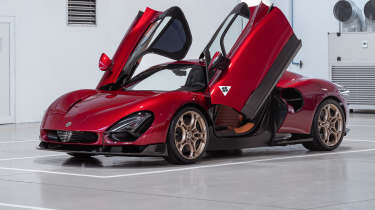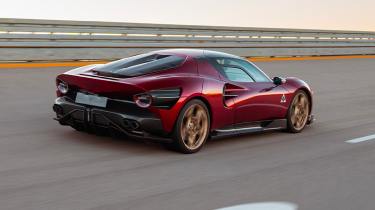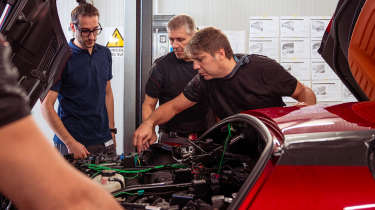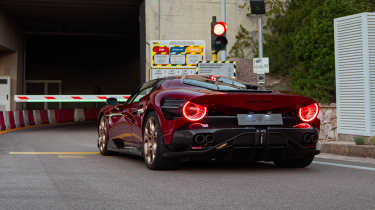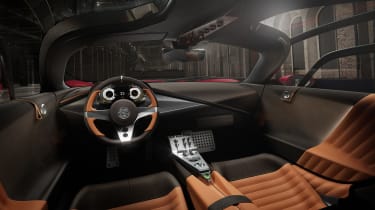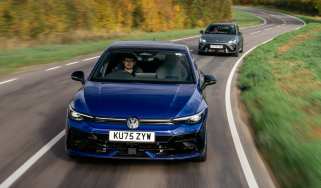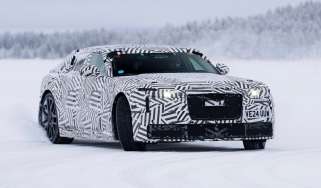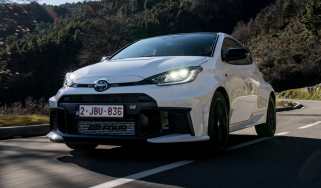The Alfa Romeo 33 Stradale is ready to hit the road
Alfa Romeo’s long-rumoured supercar lives, taking inspiration from the ’60s Tipo 33 and built on Maserati's MC20 chassis with either a 607bhp twin-turbo V6 or as a 750bhp EV
The Alfa Romeo 33 Stradale limited-run supercar is finally ready to meet its buyers, with the very first customer car having rolled off the production line. The Maserati MC20-based special has been undergoing testing and validation since its reveal earlier this year and is shown in footage reaching 207mph on a run around Nardò.
Though the car was revealed some time ago, it’s only now been shown on the move in dynamic testing, with some noise to go with it too. Of course, the noise is familiar, being a development of Maserati's Nettuno mill found in the MC20 supercar to which the 33 Stradale is related. The Nardò testing, along with pushing the performance limits of the 33, has also allowed Alfa Romeo to validate aerodynamics, temperature management and NVH.
> Alfa Romeo Junior Veloce 2024 review – a driver’s EV on a budget
Alfa Romeo has also stressed that the car will use its own ‘100% Alfa Romeo’ dual-arm suspension system with active dampers, as well as rear steering – the latter not featuring on the MC20 at all. The car will feature Strada (road) and Pista (track) modes that dictate its characteristics. The handling and braking have been refined during dynamic testing at Alfa Romeo’s iconic Balocco test track.
A new, road-going Alfa Romeo supercar has been rumoured since… well, forever. There’s been the 8C grand tourer and the 4C sports car but arguably the only true supercar in Alfa’s history is 1967’s 33 Stradale, a road-going version of the achingly pretty Tipo 33 endurance racer.
Only 33 cars will be built, echoing the name. All have been sold prior to reveal, with evo sources suggesting a price of €1.7m before taxes. We speculated on the car’s reveal about whether the design would continue from the original reveal car, to production. Judging by what we can see here, to the delight of all, it’s carried over wholesale.
The modern-day 33 was initially announced as being available as either a V6-powered petrol car, or a fully electric battery-powered car. Alfa Romeo didn’t disclose details about the sales split between combustion and EV versions and there’s been no update given here regarding the battery electric car. For reference, Maserati still has plans to produce an electric Folgore version of the MC20 supercar. Since Alfa Romeo has committed to producing only electric cars from 2025, the V6 is a swansong for the traditional Alfa Romeo performance car, and the company’s mighty V6 engine.
The cars will be assembled outside of Alfa by the Touring Superleggera coachbuilding company, a historic name which currently builds one-off and low-volume rebodied commissions based on existing cars.
Alfa Romeo CEO Jean-Philippe Imparato has implied more low-volume, custom-built Alfas could be on the cards: ‘The new 33 Stradale is the brand’s first custom-built car since 1969, and I promise it will not be the last.’
Design
As a reminder, the new 33 Stradale’s styling has been overseen by Alfa Romeo’s head of design Alejandro Mesonero-Romanos, who joined the company in 2021 having previously been design boss at Seat and briefly in charge of Dacia design at Renault.
Much of the bodywork is carbonfibre, over a structure many familiar with Maserati’s MC20 supercar will recognise (a car, ironically, that started life as a stillborn Alfa Romeo project...). Using a carbonfibre monocoque with aluminium subframes, the 33’s roof structure is a mix of carbon and aluminium with a pair of carbon butterfly doors that are cut into the roof. The rear window is made from weight-saving polycarbonate.
Measuring 4.6-metres in overall length the wheelbase is 2.7-metres long, with the 33 Stradale measuring 2.1-metres wide wing mirror tip to wing mirror tip. At 1.2-metres high it's a squat, lithe car that adds some bulk to the original's svelte lines. To save you looking them up, it's measurements are identical to an MC20 yet the Alfa looks smaller bodied and more delicate.
The 33 cars will be assembled by the Touring Superleggera coachbuilding company, a historic name which specialises in building one-off and low-volume commissions based on rebodied existing cars.
Alfa Romeo CEO Jean-Philippe Imparato has implied more low-volume, custom-built Alfas could be on the cards, stating: ‘The new 33 Stradale is the brand’s first custom-built car since 1969, and I promise it will not be the last.’ Although there will be no additional 33 derivatives.
There are no active aero surfaces on the car, a wish from customers who didn't want spoilers on their treasured Alfa; nevertheless, Alfa Romeo claims low drag and negative lift at higher speeds – a drag coefficient of 0.375 is quoted. Aerodynamic solutions include air intakes incorporated into the headlights to both feed the radiator and channel airflow, and aerodynamic winglets which double as the door mirror supports.
The front and rear one-piece bodywork sections open symmetrically in a mirror image as per the original: a deliberately theatrical touch as well as allowing easy access to the 33’s innards.
Powertrain
Petrol-engined 33 Stradales will be rear-wheel-drive only, with the same eight-speed transmission dual-clutch Tremec gearbox fitted to the MC20 as opposed to the Giulia's eight-speed ZF automatic, an e-diff will also be fitted.
Electric versions were set to use an 800v architecture, fitted with an 102kWh battery (90 kWh useable) and all-wheel-drive, with a target total power output of 750bhp and an estimated range of 280 miles. Alfa's engineering team will decide if it will follow Maserati's MC20 Folgore with a tri-motor set-up or only use one motor for each axle.
Regardless of the powertrain the 33 customers selected (at the car's reveal the split was between 70 and 80 percent opting for the V6 with the remaining going for the EV option, although Alfa said some customers are considering changing their ICE order for an EV to 'make a statement') are claimed to have a 200+mph top speed, with the V6 topping out at 207mph the BEV at over 192mph, 0-62mph for both models will be below three seconds.
Alfa promises the car will be at home on both track and road, with Strada and Pista drive modes provided that includes a launch control function. Double-wishbone suspension all round, active dampers (and a 50mm front axle lift for speedbumps, which can be activated below 25mph) is standard. 20 inch wheels are fitted front and rear with the show car fitted with Bridgestone Potenza Sport tyres measuring 245/35 on the front and 305/30 on the rear.
The 33 Stradale also features a brake-by-wire system, operating Brembo-supplied carbon-ceramic brakes, with six-piston calipers at the front and four-pot units at the rear (painted in whatever colour the customers desire), clamping 390mm and 360mm discs front/rear.
While Alfa's engineers are confident of the 33 Stradale with the V6 engine and DCT weighing in the region of 1500kg, over 200kgs lighter than a Maserati MC20, the BEV is expected to weigh over 2000kgs.
Interior
There’s a choice of two trim schemes for the interior: Tributo (referencing the original car, pictured here) and Alfa Corse (a more modern, race-inspired look, swapping the steering wheel’s aluminium spokes for carbonfibre, for example), with materials including aluminium, leather, Alcantara and carbonfibre.
The wraparound seats take inspiration from the original 33 Stradale and are six-way electrically adjustable, and a wraparound sunroof echoes the wrapover glass sections in the original car’s doors.
Refreshingly, there are no buttons on the steering wheel: controls are instead split between the centre console and the roof, with a blend of mechanical switches and a retractable touchscreen. A further request from clients was for there to be no visiable screens or unneccessary tech, which Alfa has adheared to.
Behind the wheel, there’s a 3D ‘telescope’ instrument panel, with different displays for Road or Track driving modes.
Customisation
Alfa Romeo formed a ‘Bottega’ team of designers, engineers and Tipo 33 historians, who spent several months working together with the car’s customers, to take their input on board and finalise numerous exterior design details as well as individual trim. Alfa Romeo says no two 33s will be identical. For example, some may have a 3D-design front shield like that in the concept car pictured, and some a more traditional arrangement.
Customers meet at the Bottega HQ at the Sala del Consiglio at the Alfa Romeo Museum in Arese, where the original 33 was signed off.
Furthermore, a ‘33 Committee’ has been formed by Alfa Romeo, chaired by the heads of various departments within the company, and customers’ individual choices for coatings or body colours must be approved by the committee. Outside of special requests, such as visible carbonfibre, three body colours are planned: the classic Rosso Alfa, a clearcoat Rosso, or a variation of Royal Blue. A white/red tribute livery to racing Alfa sportscars is also an official option. There’s no word yet on whether Hot Pink or metallic purple are sanctioned options by the committee, but we wouldn’t hold our breath.
Customers also choose their own VIN number for the cars, which will be engraved on the central tunnel.
